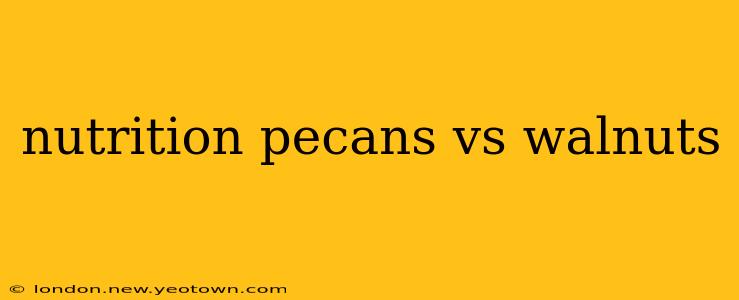For years, pecans and walnuts have battled for the top spot in the "best nut" category. Both boast impressive nutritional profiles, but which one reigns supreme? This isn't just a matter of taste; it's a head-to-head comparison of their nutritional powerhouses. Let's dive into this delicious debate!
Imagine this: You're standing in the grocery store, torn between the rich, buttery pecans and the robust, earthy walnuts. Both beckon, promising a healthy snack or a delicious addition to your favorite recipes. But which one truly offers the superior nutritional punch?
This isn't a simple "one size fits all" answer. Both pecans and walnuts offer a wealth of health benefits, but their nutritional compositions differ slightly, making them suitable for different dietary needs and preferences. Let's unpack the details.
What are the main nutritional differences between pecans and walnuts?
This is where things get interesting. While both are packed with healthy fats, fiber, and antioxidants, the specifics differ. Pecans generally contain more fat, particularly monounsaturated fats, which are considered heart-healthy. Walnuts, on the other hand, are richer in omega-3 fatty acids, particularly alpha-linolenic acid (ALA), crucial for brain health and reducing inflammation.
Let's look at a side-by-side comparison (per 1 ounce serving):
| Nutrient | Pecans | Walnuts |
|---|---|---|
| Calories | 190 | 185 |
| Total Fat | 20g | 18g |
| Saturated Fat | 2g | 1g |
| Monounsaturated Fat | 13g | 8g |
| Polyunsaturated Fat | 4g | 9g |
| Protein | 3g | 4g |
| Carbohydrates | 4g | 4g |
| Fiber | 2g | 2g |
Are pecans or walnuts better for weight loss?
Both pecans and walnuts can be part of a healthy weight management plan, but moderation is key. Their calorie density (high in calories for a small amount of food) necessitates mindful consumption. Neither nut will magically melt away pounds, but their fiber content can help promote satiety, potentially curbing overeating. The focus should always be on a balanced diet and regular exercise.
Which nut is better for heart health?
Both are heart-healthy, but in different ways. Pecans' high monounsaturated fat content contributes to lowering LDL ("bad") cholesterol, which is beneficial for cardiovascular health. Walnuts, rich in omega-3 fatty acids and antioxidants, combat inflammation and improve blood vessel function. It's more a matter of which type of heart health benefit you may prioritize.
Which nut has more antioxidants?
This is a close call. Both pecans and walnuts are excellent sources of antioxidants, which protect cells from damage. The exact antioxidant profile differs, with both offering a variety of compounds. Rather than focusing on which has "more," appreciating the diverse antioxidant power in both is key.
Are pecans or walnuts better for brain health?
Walnuts are often touted for their brain-boosting properties due to their high omega-3 fatty acid content, particularly ALA. While pecans also contribute to overall brain health through their nutrient profile, walnuts may hold a slight edge in this category.
Which nut is a better source of vitamin E?
Both are good sources of vitamin E, a potent antioxidant. However, walnuts generally contain slightly higher levels of this vitamin. Vitamin E plays a crucial role in protecting cells against damage and maintaining healthy skin and eyes.
Conclusion: The Verdict?
There's no single "winner" in the pecan vs. walnut debate. Both nuts offer a treasure trove of nutrients beneficial to overall health. The "best" choice depends on your individual dietary needs and preferences. Perhaps the best approach is to enjoy both as part of a varied, balanced diet. Remember, variety is the spice of life, and in this case, it's also a key to optimal nutrition!

